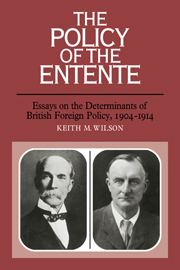Book contents
- Frontmatter
- Contents
- Acknowledgements
- Introduction
- 1 The Poverty of the Entente Policy
- 2 The Politics of Liberal Foreign Policy I
- 3 The Politics of Liberal Foreign Policy II
- 4 The Dissimulation of the Balance of Power
- 5 The Fiction of the Free Hand
- 6 The Invention of Germany
- 7 The Military Entente with France
- 8 The Cabinet's Decision for War, 1914
- Notes
- Bibliography
- Index
2 - The Politics of Liberal Foreign Policy I
Published online by Cambridge University Press: 04 August 2010
- Frontmatter
- Contents
- Acknowledgements
- Introduction
- 1 The Poverty of the Entente Policy
- 2 The Politics of Liberal Foreign Policy I
- 3 The Politics of Liberal Foreign Policy II
- 4 The Dissimulation of the Balance of Power
- 5 The Fiction of the Free Hand
- 6 The Invention of Germany
- 7 The Military Entente with France
- 8 The Cabinet's Decision for War, 1914
- Notes
- Bibliography
- Index
Summary
In May 1905 Sir Edward Grey voiced the opinion that foreign affairs were not matters of party controversy. The public treatment of foreign affairs in speeches delivered towards the end of that year and during the election campaign that followed the resignation of the Conservative Government would seem to confirm that opinion. On 6 November Lord Lansdowne welcomed a number of speeches by leading Liberals which had been ‘almost without exception favourable to the general lines of foreign policy which [the Conservatives] have pursued’. He went on:
It is good that these questions of foreign policy should be lifted out of party politics and placed on a higher and different plane. It is of immense importance that our foreign policy in this country should be a continuous policy, and not be deflected from its course by the eddies of party political opinion.
Sir H. Campbell-Bannerman, the leader of the Liberal Party, followed this on 16 November with a speech designed to counter any alarm ‘lest on any change of hands there may be some breach of continuity in our foreign policy’. He assured his audience that ‘there will be no breach in the consistency and continuity of your foreign policy so long as your foreign policy is sound’. He found no fault with the general tone, spirit and aim of Lord Lansdowne's foreign policy. Indeed, the foreign policy of the Conservative Government was ‘the best thing about it’.
- Type
- Chapter
- Information
- The Policy of the EntenteEssays on the Determinants of British Foreign Policy, 1904–1914, pp. 17 - 36Publisher: Cambridge University PressPrint publication year: 1985



